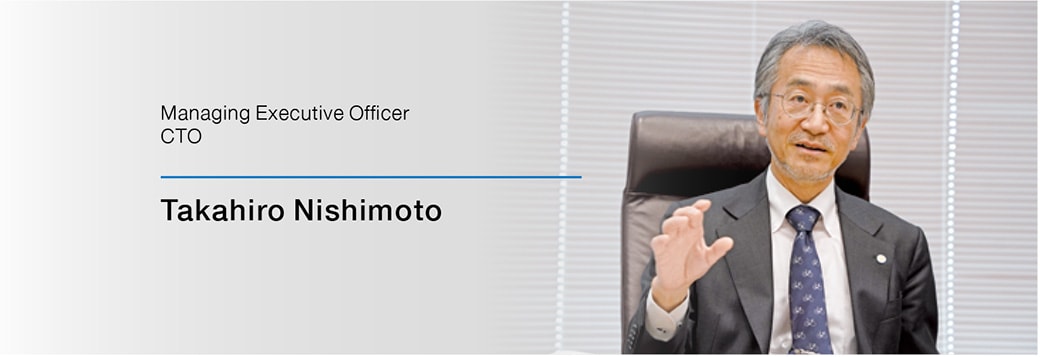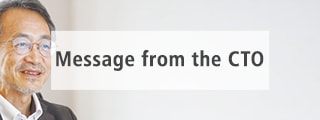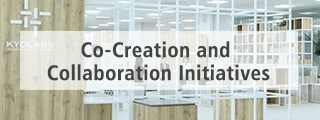
Pursuit of Planetary Health and Research & Development
Our Group has set “Planetary Health” as a theme in the medium-term management plan, and we are actively working to develop new products and new businesses based on this concept.
Planetary health is the idea that “the well-being of the Earth” and “the well-being of mankind” are interrelated, requiring a comprehensive understanding of various social issues and the pursuit of their solutions. This concept is closely related to our corporate philosophy of“ Realizing Our Wishes for the Well-being of Mankind and the Earth.” It is a concept that is both deeply rooted in our philosophy and newly significant in today’s context. I feel it is time to deeply understand this concept again and consider what we can and should do for planetary health. In our business, many new products and new businesses are technology-based, which is both a heavy responsibility and a rewarding job for engineers and researchers.
As I take on the role of CTO, my mission will be to ensure that our engineers work vibrantly and enthusiastically engage in new research and development, leading to a stream of new ideas. I feel a renewed sense of responsibility to give back to the seniors who have nurtured me since my early days as an engineer by expanding the business related to planetary health. Together, we will cooperate and collaborate across the entire Group to take on new challenges.
Achievements in the Second Year of the Medium-Term Management Plan
In the current medium-term management plan, we are executing the following three strategies in the research and development division:
- Enhancing global development capabilities
- Reforming the development process
- Improving the ability to create new technologies and businesses
We have promoted the establishment of a customer-centric global product development system and a globally distributed software development system. The R&D Center in North America, which was opened in April 2024, has supported operational environments for product development. In global software development, we have been working on building a secure service environment at each location. Operations have already begun at the headquarters, and we are gradually expanding this to our Group companies.
In reforming the development process, we are advancing the addition of agile development methods and the establishment of design DX (Digital Transformation). Agile development is still limited to a few implementations, and a full-scale rollout in the future is a challenge. In the area of design DX, we are currently managing and accumulating design, manufacturing, and quality data in a centralized manner, while in data utilization, we are demonstrating a new operational workflows.
In enhancing our ability to create new technologies and businesses, we are advancing development for new and future business opportunities, while also promoting startup investments through the CVC (Shimadzu Future Innovation Fund) established in FY2023. In its second year, FY2024, we have executed seven investments, exceeding our initial plan. These include one in the Healthcare, three in Green (two of which also fall under Materials), and three in Industry domains. This reflects accelerated investment in fields beyond the Healthcare domain, which had been a challenge in FY2023.
Challenges and Future Initiatives
From the perspective of early market introduction of new products, there are several challenges in the research and development field, and we will proceed with necessary measures in the future. In the research phase, we have been trialing several initiatives at the Technology Research Laboratory to create a system for broadening researchers’ ideas and quickly testing those ideas. We will verify the effectiveness of these initiatives and implement successful ones across departments. Additionally, we will advance necessary initiatives for smooth technology transfer from elemental technology to product design. We will promote the establishment of a collaborative system between departments developing elemental technologies and those responsible for product commercialization from the early stages of development, as well as efficiency improvements through design DX during the development phase. This is expected to accelerate development speed and improve quality through focused development operations.
Furthermore, we will pursue investments and collaborations with overseas institutions in advanced technology areas through our representative in Silicon Valley. Training research and development personnel through secondments and collaborations is also one of our key initiatives.
To quickly bring new products to market, we are actively promoting measures to expand and strengthen open innovation, one of which is the newly launched domestic research partner recruitment program, “Mirai Kyoso Challenge (Future Co-Creation Challenge).” This program sets areas that will be necessary in the future and conducts joint research on selected themes from the proposals received. Depending on the needs, we may also utilize instruments and devices owned by our Group, with the potential for further large-scale projects based on the results. This time, we received many innovative proposals addressing challenges such as the super-aging society and the development of new materials for industrial advancement. We plan to conduct this open call for proposals approximately once a year.
Future Co-Creation Starting from 150 Years
This year marks the 150th anniversary of our company, and the history of our research and development is also a history of open innovation. Starting with our collaboration with the Seimikyoku (Chemistry Bureau) during the Meiji era and the development of X-ray equipment with the Daisan High School (predecessor to Kyoto University), we have refined our technology and brought products to the market through guidance from industry leaders in various sectors, including the steel industry, petrochemicals, and pharmaceuticals, who have supported Japan’s industries throughout different eras. In recent years, we have made progress in establishing bases aimed at co-creation, such as the establishment of the Healthcare R&D Center, the opening of the SHIMADZU Future Collaboratory of the Technology Research Laboratory, and the launch of the Shimadzu Tokyo Innovation Plaza. As a result of this co-creation, research outcomes that can contribute to society are beginning to emerge. We have been able to announce the start of orders for the optical lattice clock, which enables ultra-high precision time measurement, developed in collaboration with Professor Katori from the University of Tokyo. This clock, with an error of one second in 10 billion years, can measure gravitational potential as a difference in the passage of time based on the principles of general relativity, and it has the potential to be used for measuring crustal movements. Additionally, we are rapidly advancing research toward practical application of infrared spectroscopy utilizing quantum entanglement phenomena in collaboration with Professor Takeuchi from Kyoto University. Other initiatives, including high-performance mass spectrometry, sensory measurement of human perception, and autonomous experimental systems (Autonomous Lab), are ongoing, with engineers and researchers passionately working towards the early market launch of products that can contribute to solving social issues. I am confident that these activities will accelerate co-creation as we move beyond 150 years and lead to products and businesses that contribute to planetary health. We look forward to your continued support for our future achievements.
Career History
| Mar. 1989 | Joined Shimadzu Corporation | |
| Oct. 2003 | R&D Manager, Technology Research Laboratory | |
| Apr. 2014 | Deputy General Manager, Technology Research Laboratory and General Manager, Business Development Department, Technology Research Laboratory | |
| Oct. 2020 | General Manager, Global Strategy Planning Unit, Corporate Strategy Planning Department | |
| Apr. 2022 | General Manager, Technology Research Laboratory | |
| Apr. 2024 | Corporate Officer, General Manager of Technology Research Laboratory | |
| Apr. 2025 | Managing Executive Officer, CTO (current) |











